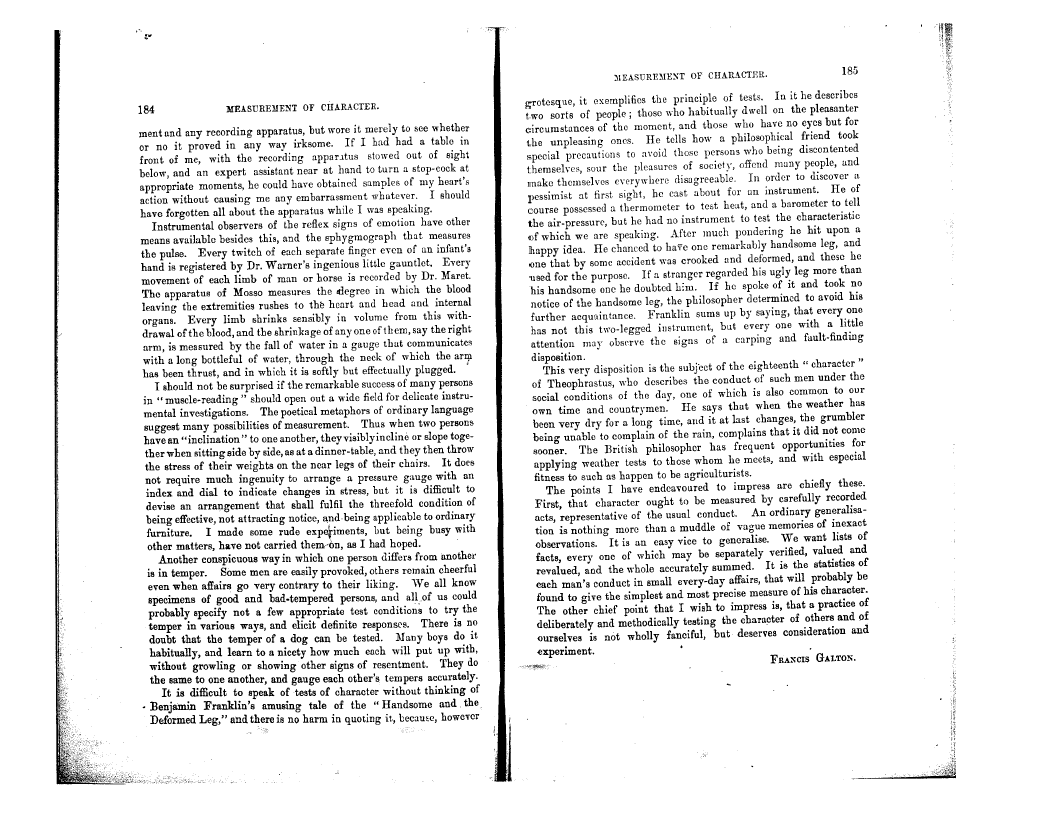OCR Rendition - approximater
184 MEASUREMENT OF CHARACTER.
ment and any recording apparatus, but wore it merely to see whether or no it proved in any way irksome. If I had bad a table in front of me, with the recording apparatus stowed out of sight below, and an expert assistant near at hand to turn a stop-cock at appropriate moments, he could have obtained samples of my heart's action without causing me any embarrassment wbutever. I should have forgotten all about the apparatus while I was speaking.
Instrumental observers of the reflex signs of emotion have other means available besides this, and the sphygmograph that measures the pulse. Every twitch of each separate finger even of an infant's hand is registered by Dr. Warner's ingenious little gauntlet. Every movement of each limb of man or horse is recorded by Dr. Maret. The apparatus of Mosso measures the degree in which the blood leaving the extremities rushes to the heart and bead and internal organs. Every limb shrinks sensibly in volume from this withdrawal of the blood, and the shrinkage of any one of them, say the right arm, is measured by the fall of water in a gauge that communicates with along bottleful of water, through the neck of which the arm has been thrust, and in which it is softly but effectually plugged.
I should not be surprised if the remarkable success of many persons in " muscle-reading " should open out a wide field for delicate instrumental investigations. The poetical metaphors of ordinary language suggest many possibilities of measurement. Thus when two persons have an "inclination" to one another, they visibly incline or slope together when sitting side by side, as at a dinner-table, and they then throw the stress of their weights on the near legs of their chairs. It does not require much ingenuity to arrange a pressure gauge with an index and dial to indicate changes in stress, but it is difficult to devise an arrangement that shall fulfil the threefold condition of being effective, not attracting notice, and•being applicable to ordinary furniture. I made some rude expe'iments, but being busy with other matters, have not carried them-on, as I had hoped.
Another conspicuous way in which one person differs from another is in temper. Some men are easily provoked, others remain cheerful even when affairs go very contrary to their liking. We all know specimens of good and bad-tempered persons, and all,of us could probably specify not a few appropriate test conditions to try the temper in various ways, and elicit definite responses. There is no doubt that the temper of a dog can be tested. Many boys do it habitually, and learn to a nicety how much each will put up with, without growling or showing other signs of resentment. They do the same to one another, and gauge each other's tempers accurately.
It is difficult to speak of tests of character without thinking of Benjamin Franklin's amusing tale of the "Handsome and. the. Deformed Leg," and there is no harm in quoting it., because, however
MEASUREMENT OF CHARACTER. 185
grotesque, it exemplifies the principle of tests. In it he describes two sorts of people ; those who habitually dwell on the pleasanter circumstances of the moment, and those who have no eyes but for the unpleasing ones. He tells how a philosophical friend took special precautions to avoid those persons who being discontented themselves, sour the pleasures of society, offend many people, and make themselves everywhere disagreeable. In order to discover a pessimist at first sight, be cast about for an instrument. He of course possessed a thermometer to test heat, and a barometer to tell the air-pressure, but he had no instrument to test the characteristic of which we are speaking. After much pondering he hit upon a happy idea. He chanced to have one remarkably handsome leg, and one that by some accident was crooked and deformed, and these he used for the purpose. If a stranger regarded his ugly leg more than his handsome one he doubted him. If be spoke of it and took no notice of the handsome leg, the philosopher determined to avoid his further acquaintance. Franklin sums up by saying, that every one has not this two-legged instrument, but every one with a little attention may observe the signs of a carping and fault-finding disposition.
This very disposition is the subject of the eighteenth " character " of Theophrastus, who describes the conduct of such men under the social conditions of the day, one of which is also common to our own time and countrymen. lie says that when the weather has been very dry for a long time, and it at last changes, the grumbler being unable to complain of the rain, complains that it did not cone sooner. The British philosopher has frequent opportunities for applying weather tests to those whom be meets, and with especial fitness to such as happen to be agriculturists.
The points I have endeavoured to impress are chiefly these. First, that character ought to be measured by carefully recorded acts, representative of the usual conduct. An ordinary generalisation is nothing more than a muddle of vague memories of inexact observations. It is an easy vice to generalise. We want lists of facts, every one of which may be separately verified, valued and revalued, and the whole accurately summed. It is the statistics of each man's conduct in small every-day affairs, that will probably be found to give the simplest and most precise measure of his character. The other chief point that I wish to impress is, that a practice of deliberately and methodically testing the character of others and of ourselves is not wholly fanciful, but deserves consideration and experiment.
FRANCIS G.ZToN.
|

